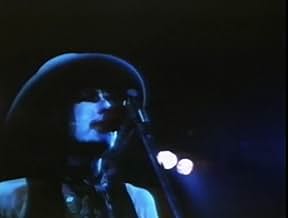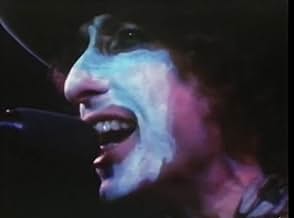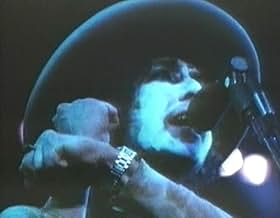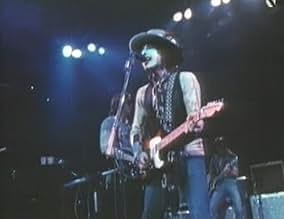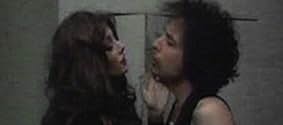IMDb RATING
6.6/10
639
YOUR RATING
Bob Dylan on tour with the Rolling Thunder Revue in 1975; concert footage, documentary interviews and bizarre improvised character scenes.Bob Dylan on tour with the Rolling Thunder Revue in 1975; concert footage, documentary interviews and bizarre improvised character scenes.Bob Dylan on tour with the Rolling Thunder Revue in 1975; concert footage, documentary interviews and bizarre improvised character scenes.
- Awards
- 2 wins total
Ramblin' Jack Elliott
- Longheno de Castro
- (as Jack Elliott)
Ruth Tyrangel
- The Girlfriend
- (as Ruth Tyrangiel)
J. Stephen Soles
- Ramon
- (as Steven Soles)
- Director
- Writer
- All cast & crew
- Production, box office & more at IMDbPro
Featured reviews
Bob Dylan has never made it as an actor. Nothing proves this better than his role as Billy Parker in "Hearts of Fire" (1987). Even his minor role as "Alias" in Sam Peckinpah's "Pat Garrett and Billy the Kid" (1973) was lackluster. The song he wrote for the film, "Knockin' On Heaven's Door," however, has survived as an anthem.
But "Renaldo & Clara" is a very different sort of film. It runs nearly 4 hours and chronicles a concert tour, "The Rolling Thunder Revue." It is filled with interesting people, good music and impromptu dialogue. Even with so much situational dialogue, Dylan shared writing credits with the distinguished playwright Sam Shepard. Perhaps the thing that makes it such a valuable cinematic document is that it bridges the gap in American cultural history between the "Beat Generation" and the emerging post-modern movement.
Critics panned the film at the time of its release, probably because they did not understand that were standing at the convergence of two great social tides. What they saw as an overly long movie without the benefit of tight plotting was really the melding of "beat" stream-of-consciousness and Dylan's own unique post-modern artistic sensibilities. Critics could only compare it to some lengthy epic from India because they had no other frame of reference at the time.
In the film, the troupe re-enacts an old "true-life love triangle" (Joan Baez and Sara Dylan) and, with Allen Ginsberg, pays homage at the grave of Jack Kerouac. There are visits with Rueben "Hurricane" Carter in his jail cell and off-stage antics. It has many whimsical moments, plenty of hard-driving rock and roll and yes, it veers off the track on several occasions, but even those moments are not without their poetry.
Dylan himself takes directorial credit, and while he was surely the man in control of his vision, one must look to the person credited as Assistant Director for the more mundane aspects. This man was Jacques Levy, a former New York City psychologist who had dabbled on Broadway and whose only other screen directorial credit up to that time was for "Oh! Calcutta!" (1972), the nostalgic strip show. Peter McGuinn of the Byrds introduced Dylan and Levy in 1969. Interestingly, Levy and Dylan co-wrote all but two of the songs on Dylan's 1976 album "Desire," including "Hurricane," "Isis," "Joey," "Romance in Durango" and others which appear on the film soundtrack. Levy now teaches theater at Colgate University.
However, at the time the film was made, Levy probably could not be considered to have mastery as a director. Nor could claims of mastery be made by cinematographer and film editor Howard Alk, whose career peaked with this film. The producer was Mel Howard, and his only other credit as a producer at the time was "Quackser Fortune Has a Cousin in the Bronx" (1970). The point to mentioning all this is that Dylan was not surrounded by an over-abundance of talent when he made the film, other than the performers with him on the screen. It is testimony to Dylan's own talent that his vision was realized to any degree.
It is said that Dylan was unhappy with D.A. Pennebaker's documentary of his 1965 UK tour, "Dont Look Back," (also featuring Baez, and even Allen Ginsberg in the background of the famous "Subterranean Homesick Blues" que card scene) because he didn't get a cut of the financial action. Yet, "Renaldo and Clara" owes something to Pennebaker's work. It has the same freshness, style and spontaneity, though it is darker and more original.
"Renaldo and Clara" is a complex film. It's a concert tour film, a love story, a dues-paying to artistic influences. But simply because it is long and complex does not mean it is without its many joys. If Fellini had signed his name to this cinematic work of art, it might have been considered a masterpiece.
But "Renaldo & Clara" is a very different sort of film. It runs nearly 4 hours and chronicles a concert tour, "The Rolling Thunder Revue." It is filled with interesting people, good music and impromptu dialogue. Even with so much situational dialogue, Dylan shared writing credits with the distinguished playwright Sam Shepard. Perhaps the thing that makes it such a valuable cinematic document is that it bridges the gap in American cultural history between the "Beat Generation" and the emerging post-modern movement.
Critics panned the film at the time of its release, probably because they did not understand that were standing at the convergence of two great social tides. What they saw as an overly long movie without the benefit of tight plotting was really the melding of "beat" stream-of-consciousness and Dylan's own unique post-modern artistic sensibilities. Critics could only compare it to some lengthy epic from India because they had no other frame of reference at the time.
In the film, the troupe re-enacts an old "true-life love triangle" (Joan Baez and Sara Dylan) and, with Allen Ginsberg, pays homage at the grave of Jack Kerouac. There are visits with Rueben "Hurricane" Carter in his jail cell and off-stage antics. It has many whimsical moments, plenty of hard-driving rock and roll and yes, it veers off the track on several occasions, but even those moments are not without their poetry.
Dylan himself takes directorial credit, and while he was surely the man in control of his vision, one must look to the person credited as Assistant Director for the more mundane aspects. This man was Jacques Levy, a former New York City psychologist who had dabbled on Broadway and whose only other screen directorial credit up to that time was for "Oh! Calcutta!" (1972), the nostalgic strip show. Peter McGuinn of the Byrds introduced Dylan and Levy in 1969. Interestingly, Levy and Dylan co-wrote all but two of the songs on Dylan's 1976 album "Desire," including "Hurricane," "Isis," "Joey," "Romance in Durango" and others which appear on the film soundtrack. Levy now teaches theater at Colgate University.
However, at the time the film was made, Levy probably could not be considered to have mastery as a director. Nor could claims of mastery be made by cinematographer and film editor Howard Alk, whose career peaked with this film. The producer was Mel Howard, and his only other credit as a producer at the time was "Quackser Fortune Has a Cousin in the Bronx" (1970). The point to mentioning all this is that Dylan was not surrounded by an over-abundance of talent when he made the film, other than the performers with him on the screen. It is testimony to Dylan's own talent that his vision was realized to any degree.
It is said that Dylan was unhappy with D.A. Pennebaker's documentary of his 1965 UK tour, "Dont Look Back," (also featuring Baez, and even Allen Ginsberg in the background of the famous "Subterranean Homesick Blues" que card scene) because he didn't get a cut of the financial action. Yet, "Renaldo and Clara" owes something to Pennebaker's work. It has the same freshness, style and spontaneity, though it is darker and more original.
"Renaldo and Clara" is a complex film. It's a concert tour film, a love story, a dues-paying to artistic influences. But simply because it is long and complex does not mean it is without its many joys. If Fellini had signed his name to this cinematic work of art, it might have been considered a masterpiece.
Renaldo and Clara (1978) 235 min., Theatrical cut
* 1/2 (out of 4)
Bob Dylan plays Renaldo, his real life wife Sara plays Clara and Joan Baez, Dylan's long-time mistress, plays The Woman in White. This 1978 film features Dylan as director and it hit theaters with a huge bomb as critics tore it apart, fans didn't show up to see it and some theater owners refused to play it. Dylan later edited the film down to 122-minutes, which featured mostly concert stuff, but this version hasn't been seen since the original release. All of this was filmed during Dylan's 1975 Rolling Thunder Revue, which in my opinion featured Dylan's at his best and only ranking second behind the legendary 1966 tour. The gimmick of this tour was that Dylan, along with Baez, Jack Elliott, Bob Neuwirth and various others would tour around the country without announcing any dates. Instead, they'd simply have their tour bus stop and the concert would take place within the matter of days, if not on that day itself.
As far as a story goes, it's all over the place. We have the central story of Renaldo and Clara and the husband's affair with The Lady in White, which is clearly drawn off Dylan's own marital issues. We also have Ronnie Hawkins playing Bob Dylan with Ronne Blakley playing his wife with these segments centering on the price of being a legend. We also have other wide range of events with coverage of Rubin "Hurricane" Carter taking some of the running time, which this tour, with Dylan's song "Hurricane", was trying to bring awareness to his case.
I'm a die-hard Dylan fan but the first hour of this film is among the worst stuff ever put to film. The movie is downright self indulgent, self centered and very poorly directed. However, with that said, something happens during the later part of the film, which for about an hour, makes it somewhat entertaining. It's really hard to absolutely trash this film because the concert footage is very special and feature some great tracks. Dylan, appearing in whiteface, does some of his greatest stuff on this tour and that features the greatest versions of "It Ain't Me Babe" and "A Hard Rain's A-Gonna Fall". Both of these classic folk tunes are given the "rock-a-billy" treatment and I've yet to hear better versions. Dylan also plays more recent turns including a blazing version of "Iris", a heartbreaking version of "Sara" and the opening number "When I Paint My Masterpiece". You also have a very heartfelt and deeply emotional performance of "Just Like a Woman" and a great country version of "I Want You". Dylan fans will also be interested in a brief clip of "Sad Eyed Lady of the Lowlands", which is the only known performance of this song, although it can only be heard briefly in the background. We also get a cover of "House of the Rising Sun" and duets with Baez on "Blowin' in the Wind" and "I Shall Be Released".
Even with the great music, for the most part this film is a total washout as we're watching home movies for nearly four hours. There's no camera-work to speak of as the camera is simply all over the place and there's never any clear focus or shots set up. It appears everything was done with one take and the ugliness of the picture really comes through. However, I will add, that I've never seen a film like this so perhaps that's another positive for the film. There are countless scenes that come out of no where and really mean nothing including a very long sequence with Indians fighting over equal rights. We also get countless scenes of David Blue talking about the old days of the Village where Dylan and various others got their start. There are some interesting insights here but the footage just keeps going and going to the point where it gets boring. There's also footage with Rubin "Hurricane" Carter that is pretty interesting as we see him in jail, although none of the concert footage of Dylan performing at the prison is included (only news footage is currently available via bootlegs). There's some other nice stuff including the stage being set up, Dylan before and after shows as well as other sequences where we get to see Dylan being Dylan but I doubt anyone, outside of major fans, are going to sit through four hours of stuff just for these magical moments.
In the end, this film is a total disaster that only die-hard fans will enjoy. In fact, I'd bet most people couldn't get past the one hour mark with this thing, which is the reason this thing didn't stay in theaters over a week. The movie has been pulled by Dylan, which means the only way to see it are through bootlegs but who knows if Dylan will ever let the movie be released again. I'd certainly love to hear from him and what the film was trying to do but the closest we've come to this is an interview where Dylan said people should be stoned when they watch it. Sadly, I didn't have any reefer handy when i viewed the film so I can't comment on how true that statement is. Again, this is a very special period in Dylan's career but this documentary/film doesn't touch upon its greatness. The Rolling Thunder Revue would run into early 1976 before ticket sales turned bad and the West Coast tour was canceled all together. Thankfully Columbia released "Live 1975" as part of their Genuine Bootleg Series, which is highly recommended. Also available is the original live CD "Hard Rain", which also produced a TV show and an alternate version, which hasn't been released outside of bootlegs.
* 1/2 (out of 4)
Bob Dylan plays Renaldo, his real life wife Sara plays Clara and Joan Baez, Dylan's long-time mistress, plays The Woman in White. This 1978 film features Dylan as director and it hit theaters with a huge bomb as critics tore it apart, fans didn't show up to see it and some theater owners refused to play it. Dylan later edited the film down to 122-minutes, which featured mostly concert stuff, but this version hasn't been seen since the original release. All of this was filmed during Dylan's 1975 Rolling Thunder Revue, which in my opinion featured Dylan's at his best and only ranking second behind the legendary 1966 tour. The gimmick of this tour was that Dylan, along with Baez, Jack Elliott, Bob Neuwirth and various others would tour around the country without announcing any dates. Instead, they'd simply have their tour bus stop and the concert would take place within the matter of days, if not on that day itself.
As far as a story goes, it's all over the place. We have the central story of Renaldo and Clara and the husband's affair with The Lady in White, which is clearly drawn off Dylan's own marital issues. We also have Ronnie Hawkins playing Bob Dylan with Ronne Blakley playing his wife with these segments centering on the price of being a legend. We also have other wide range of events with coverage of Rubin "Hurricane" Carter taking some of the running time, which this tour, with Dylan's song "Hurricane", was trying to bring awareness to his case.
I'm a die-hard Dylan fan but the first hour of this film is among the worst stuff ever put to film. The movie is downright self indulgent, self centered and very poorly directed. However, with that said, something happens during the later part of the film, which for about an hour, makes it somewhat entertaining. It's really hard to absolutely trash this film because the concert footage is very special and feature some great tracks. Dylan, appearing in whiteface, does some of his greatest stuff on this tour and that features the greatest versions of "It Ain't Me Babe" and "A Hard Rain's A-Gonna Fall". Both of these classic folk tunes are given the "rock-a-billy" treatment and I've yet to hear better versions. Dylan also plays more recent turns including a blazing version of "Iris", a heartbreaking version of "Sara" and the opening number "When I Paint My Masterpiece". You also have a very heartfelt and deeply emotional performance of "Just Like a Woman" and a great country version of "I Want You". Dylan fans will also be interested in a brief clip of "Sad Eyed Lady of the Lowlands", which is the only known performance of this song, although it can only be heard briefly in the background. We also get a cover of "House of the Rising Sun" and duets with Baez on "Blowin' in the Wind" and "I Shall Be Released".
Even with the great music, for the most part this film is a total washout as we're watching home movies for nearly four hours. There's no camera-work to speak of as the camera is simply all over the place and there's never any clear focus or shots set up. It appears everything was done with one take and the ugliness of the picture really comes through. However, I will add, that I've never seen a film like this so perhaps that's another positive for the film. There are countless scenes that come out of no where and really mean nothing including a very long sequence with Indians fighting over equal rights. We also get countless scenes of David Blue talking about the old days of the Village where Dylan and various others got their start. There are some interesting insights here but the footage just keeps going and going to the point where it gets boring. There's also footage with Rubin "Hurricane" Carter that is pretty interesting as we see him in jail, although none of the concert footage of Dylan performing at the prison is included (only news footage is currently available via bootlegs). There's some other nice stuff including the stage being set up, Dylan before and after shows as well as other sequences where we get to see Dylan being Dylan but I doubt anyone, outside of major fans, are going to sit through four hours of stuff just for these magical moments.
In the end, this film is a total disaster that only die-hard fans will enjoy. In fact, I'd bet most people couldn't get past the one hour mark with this thing, which is the reason this thing didn't stay in theaters over a week. The movie has been pulled by Dylan, which means the only way to see it are through bootlegs but who knows if Dylan will ever let the movie be released again. I'd certainly love to hear from him and what the film was trying to do but the closest we've come to this is an interview where Dylan said people should be stoned when they watch it. Sadly, I didn't have any reefer handy when i viewed the film so I can't comment on how true that statement is. Again, this is a very special period in Dylan's career but this documentary/film doesn't touch upon its greatness. The Rolling Thunder Revue would run into early 1976 before ticket sales turned bad and the West Coast tour was canceled all together. Thankfully Columbia released "Live 1975" as part of their Genuine Bootleg Series, which is highly recommended. Also available is the original live CD "Hard Rain", which also produced a TV show and an alternate version, which hasn't been released outside of bootlegs.
When it was theatrically released in most of Europa,BOb Dylan's work was boiled down to a 100 min version.I had to wait almost thirty years to see the complete movie (about 4 hours).Was it worth the wait?
The performances make me inclined to think that it was.Virtually all the songs Dylan performs are great live moments,and it would be wise to release (I think it has already been done)an only-songs DVD:Wearing a mask,or with his white make-up,Dylan's sings his songs as if "a life were depending on them " (and in the case of "Hurricane" it is true!):all the songs from the "desire" album are superior to the studio tracks:"Isis", "one more cup of coffee" and "romance in Durango" are almost spooky.The "blood on the tracks" material triumphs too: "tangled up is blue " will blow your mind and a strange "if you see her say hello" accompanied on piano which is heard when Dylan and Baez walk across the snow is so "new" I did not recognize the song at first."A hard rain 's gonna fall becomes a heavy metal stomp which makes the original 1963 version sound like a demo.There's also a countrified "I want you" (not as stunning,perhaps ,as the slow Budokan version),a moving "Sarah" (Lowndes)and a rare live version (heard as background)of "Sad Eyed Lady of the Lowlands " .
We are also treated to the delights of the duets.I'm not the kind of people to tell you that Baez "is holding Bob back and makes him a robot on a leash":when they sing together ,I'm on cloud nine Johnny Ace's "never let me go" is brilliant and a very long version of "the water is wide" is heard during one of the numerous scenes of the Renaldo/Clara/Woman in White triangle.
Baez's "Diamonds and rust" is admirable but unfortunately it is cut ,which is a shame!Roger McGuinn gives a riveting instrumental version of his Byrds classic "Eight Miles High" with Baez's doing the frug to it and then leads the band into a blistering version of "Chesnut mare" another Byrds classic.
I would not go as far as to write that the non-musical sequences were as magical as the others.David Blue playing pinball and remembering the Village days is not really absorbing (although he mentions Phil Ochs -who could have been part of the Rolling Thunder Review);the love triangle deals with the three involved persons's private lives and I do not think it will interest the younger generation who almost knows nothing about their love affairs;outside of the handful of artists I've mentioned,the other musical sequences are average-to-poor.
One can save the scenes on the street concerning Rubin Carter and the one when Ginsberg and Dylan visit Jack Kerouac's grave .Even more disturbing is this other sequence in a graveyard where the two men speak of Jesus and the Way of the Cross.This and "people get ready " ("there's no room for the hopeless sinner") might explain Dylan's sudden (and short-lived) conversion to Christianity in the late seventies.
"Renaldo and Clara" is a hotchpotch ;it's hard to imagine a non Dylan buff sitting through these four hours.
Like this? Try this: "Hard Rain" a 1976 concert:they wrote that the Rolling Thunder Review was moribund at the time but don't you believe them!"Hard rain" is one -hour long and there is never a dull moment !(most of the material was released on the eponymous album)
The performances make me inclined to think that it was.Virtually all the songs Dylan performs are great live moments,and it would be wise to release (I think it has already been done)an only-songs DVD:Wearing a mask,or with his white make-up,Dylan's sings his songs as if "a life were depending on them " (and in the case of "Hurricane" it is true!):all the songs from the "desire" album are superior to the studio tracks:"Isis", "one more cup of coffee" and "romance in Durango" are almost spooky.The "blood on the tracks" material triumphs too: "tangled up is blue " will blow your mind and a strange "if you see her say hello" accompanied on piano which is heard when Dylan and Baez walk across the snow is so "new" I did not recognize the song at first."A hard rain 's gonna fall becomes a heavy metal stomp which makes the original 1963 version sound like a demo.There's also a countrified "I want you" (not as stunning,perhaps ,as the slow Budokan version),a moving "Sarah" (Lowndes)and a rare live version (heard as background)of "Sad Eyed Lady of the Lowlands " .
We are also treated to the delights of the duets.I'm not the kind of people to tell you that Baez "is holding Bob back and makes him a robot on a leash":when they sing together ,I'm on cloud nine Johnny Ace's "never let me go" is brilliant and a very long version of "the water is wide" is heard during one of the numerous scenes of the Renaldo/Clara/Woman in White triangle.
Baez's "Diamonds and rust" is admirable but unfortunately it is cut ,which is a shame!Roger McGuinn gives a riveting instrumental version of his Byrds classic "Eight Miles High" with Baez's doing the frug to it and then leads the band into a blistering version of "Chesnut mare" another Byrds classic.
I would not go as far as to write that the non-musical sequences were as magical as the others.David Blue playing pinball and remembering the Village days is not really absorbing (although he mentions Phil Ochs -who could have been part of the Rolling Thunder Review);the love triangle deals with the three involved persons's private lives and I do not think it will interest the younger generation who almost knows nothing about their love affairs;outside of the handful of artists I've mentioned,the other musical sequences are average-to-poor.
One can save the scenes on the street concerning Rubin Carter and the one when Ginsberg and Dylan visit Jack Kerouac's grave .Even more disturbing is this other sequence in a graveyard where the two men speak of Jesus and the Way of the Cross.This and "people get ready " ("there's no room for the hopeless sinner") might explain Dylan's sudden (and short-lived) conversion to Christianity in the late seventies.
"Renaldo and Clara" is a hotchpotch ;it's hard to imagine a non Dylan buff sitting through these four hours.
Like this? Try this: "Hard Rain" a 1976 concert:they wrote that the Rolling Thunder Review was moribund at the time but don't you believe them!"Hard rain" is one -hour long and there is never a dull moment !(most of the material was released on the eponymous album)
Quirky, idiosyncratic, often confusing and much too long mixture of concert footage, documentary and fictional scenes is definitely fascinating to watch, but one wonders, if Bob Dylan ever was certain about his intentions to create this film or whether he had an idea who its potential audience would be.
Did you know
- TriviaThe film got many negative reviews, and some theaters refused to show it. Most theaters showed a two-hour cut that was mostly concert footage. The original four-hour director's cut was first shown on European television years later.
- Quotes
The Truck Driver: Why are you so much in a hurry? Is the law after you?
Renaldo: I am the law!
- Crazy creditsThe opening credits end with a title card reading "A Film by BOB DYLAN" directed after he is credited as writer and director. The closing credits are divided in three sections, separated by wide time gaps, played over a different artist, soul singer Hal Frazier, performing "In The Morning", a song written by Barry Gibb.
- Alternate versionsOriginally released at 292 minutes (yes, that's almost five hours!). After dismal box office returns, Dylan shortened the film to 122 minutes removing almost all of the narrative storyline and leaving mostly concert footage.
- ConnectionsFeatured in Bob Dylan: Change on the Tracks (2008)
- SoundtracksWhen I Paint My Masterpiece
Written and performed by Bob Dylan
- How long is Renaldo and Clara?Powered by Alexa
Details
- Runtime
- 3h 55m(235 min)
- Sound mix
- Aspect ratio
- 1.85 : 1
Contribute to this page
Suggest an edit or add missing content

